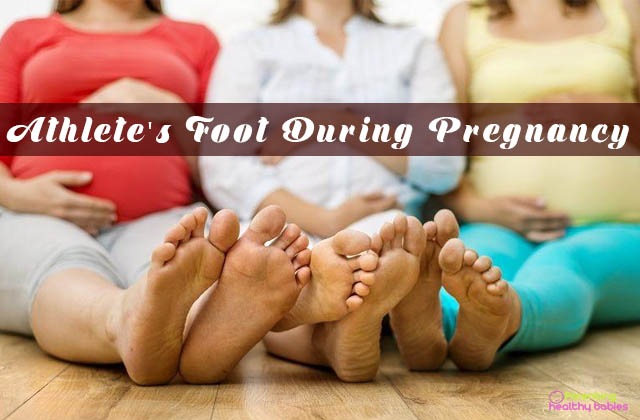Foot changes are common during pregnancy – everything from weight gain to fluid retention to hormonal fluctuations can affect how your feet feel, how you walk on them, and even muscle cramping and varicose veins you may develop. If you’re experiencing burning, stinging, and itching on your feet accompanied by small red bumps or blisters, however, you may be dealing with an infection known as athlete’s foot.
Even though athlete’s are more prone to developing these contagious fungal infections, hence the name, it’s estimated that anywhere between 15 and 25 percent of the general population has athlete’s foot at any one time. It’s incredibly common in part because the fungus that causes it is so easily spread. You can pick up athlete’s foot simply by coming into contact with a contaminated floor, shoe, towel, and so forth. In addition to a noticeable rash, you may also notice flaking, fissuring, and scaling of the skin between your toes and on the soles and sides of your feet.
Athlete’s Foot During Pregnancy: Is It Safe?
There are a handful of factors that can make pregnant women more susceptible to catching athlete’s foot including:
-
Skipping routine foot care. Gas, bloating, weight gain, and abdominal distention make bending over and tending to foot hygiene that much harder during pregnancy.
-
Going barefoot because shoes no longer fit. Walking around barefoot at home isn’t a big deal, but around public restrooms, locker rooms, and changing areas (like in the gym), you can encounter much more athlete’s foot-causing fungus.
-
Changes in hormones. Hormonal imbalances can increase how much you sweat during pregnancy, and with 125,000 glands a piece, your feet are going to release a ton of moisture, fostering a breeding environment fungi love.
Athlete’s foot can also spread from your feet to other areas of your body so it is critical that you tackle it as soon as you suspect an infection, and not wait it out until your baby arrives.
What Expecting Moms Should Know About Treating Athlete’s Foot
The good news is that a simple case of athlete’s foot can be treated with over-the-counter antifungal remedies like creams, lotions, sprays, and powders. The not-so-good news for expecting mothers, however, is that oftentimes these treatment options contain tons of chemicals that could jeopardize your unborn baby’s health.
A 2008 study published in the American Journal of Obstetrics and Gynecology found that while exposure to antifungals during the first trimester was not strongly linked with increased risk for birth defects, there was an association with hypoplastic left heart syndrome that begged further research.
Additional research has linked some antifungal foot sprays with heart defects and some oral antifungal drugs with miscarriages so it is critical that you speak with your doctor before treating your athlete’s foot at home. The side effects some athlete’s foot treatments could have on your baby are not worth the risk.
There are some plant-based, alternative remedies you can try as well to avoid using harmful chemical treatments. These include a diluted tea tree oil solution which was shown in a 2002 study to work 64 percent of the time when applied twice daily for four weeks. You may also want to use blister protectors like moleskin or band-aids to protect an existing rash from being irritated by your socks or footwear.
Preventing Athlete’s Foot
Your best bet during pregnancy is to take simple steps to prevent athlete’s foot from developing altogether. Keep these tips in mind:
-
Keep feet as dry as possible by wearing well-ventilated (or open-toed) shoes and moisture-wicking socks.
-
Change socks frequently (at least every day) and wash them with your warm/hot loads.
-
Wear flip-flops around public areas like changing rooms, pools, public restrooms, etc.
-
Routinely wash and thoroughly dry feet.
-
Don’t share shoes, linens, socks, or other items with someone who might have athlete’s foot.
-
Clean your bathroom floor regularly to eliminate contaminants like the fungus that causes athlete’s foot.
-
Alternate work out shoes to allow pairs to fully air out before wearing them again
Pregnancy is full of all kinds of highs and the occasional low, like sciatic nerve pain or athlete’s foot. Don’t let a common skin infection ruin what can be one of the most exciting times of your life. As soon as you suspect athlete’s foot, talk to your doctor and work to eliminate it as soon as possible (and prevent it from returning)!
Hope this article was of help to you! Please share your comments/queries/tips with us and help us create a world full of Happy, Healthy and Empowered Women!!













